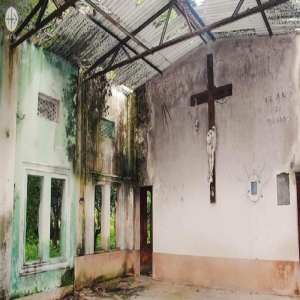
.jpg)
Ayatu Ram Podiyami never imagined that his quiet faith would provoke a mob. On the morning of February 12, 2024, in Gufanpal village, Sukma District, Chhattisgarh, the tribal Christian father of three was dragged from his home and beaten with iron rods. His father, Mahngu Ram, was left unconscious. Their crime? Refusing to renounce Christianity.
Just days earlier, Ayatu had been summoned by the village council and given an ultimatum: abandon your faith or face the consequences. When he stood firm, over 250 villagers surrounded his home. He fled into the jungle—twice—to escape the mob, returning only to carry his injured father to the government hospital in Sukma. But when he sought justice, the police allegedly fabricated the FIR, dismissing the attack as a "family feud."
"They told me I had betrayed my ancestors," Ayatu later said. "But I will not betray the peace I have found in Christ."
His story is not an isolated one. Across India's tribal belts, Christian believers—especially Dalits and Adivasis—are being targeted with increasing hostility. According to the Evangelical Fellowship of India, four to five churches or pastors are attacked every day. The United Christian Forum reports over 800 incidents of violence in 2024 alone, with Uttar Pradesh and Chhattisgarh emerging as epicentres of persecution.
Pastor Mahesh, from central India, recounts a harrowing ordeal: "The villagers threatened me, beat me, and even tried to destroy our church. But our faith in Jesus only grew stronger." After being cast out of his home and denied his inheritance, Mahesh continued to lead worship online, even as mobs stormed his church, shouting "Jai Sri Ram" and beating worshippers with sticks.
In another village, a pastor's wife stood defiantly amid chaos, shouting "Praise the Lord!" as attackers vandalised their church. "We're not feeling sorry about the persecution," the pastor later said. "Instead, we thank God, because now we are ready to face even greater persecution like this."
These testimonies echo the ancient cry recorded in Exodus 3:7: "I have indeed seen the misery of my people... I have heard them crying out... and I am concerned about their suffering." Injustice, whether ignored by law or amplified by mobs, is never invisible to God. Nor is it immune to history's reckoning.
Retribution—divine or karmic—has visited tyrants across time. Adolf Hitler died in a bunker as his empire collapsed. Benito Mussolini was executed and hanged in public disgrace. Saddam Hussein was captured, tried, and hanged. Muammar Gaddafi was dragged from a drainage pipe and killed by his own people. Even Joseph Stalin, though he died in office, left behind a legacy so stained that his successors dismantled the cult of fear he built.
These are not tales of vengeance. They are reminders that cruelty is never invincible. That the cries of the oppressed echo across generations. That justice, though delayed, does not forget.
Indian scriptures, too, speak with moral clarity about the fate of those who harm the innocent. The Bhagavad Gita warns that adharma—unrighteous action—bears inevitable fruit: "The intricacies of karma are hard to understand... one must understand what is forbidden action." Violence against the blameless is forbidden, and its consequences are inescapable (Bhagavad Gita 4:17).
The Manusmriti declares: "He who injures the innocent, who speaks falsely, who betrays others—such a man shall reap the results of his sin, even if he hides it." (Manusmriti 8:15).
The Mahabharata affirms that "the tears of the innocent do not fall to the ground in vain. They rise to the heavens and call forth justice." And the Atharva Veda pleads: "Let not the wicked harm the righteous. Let justice be swift and impartial." (Shanti Parva 265).
Even in the Ramayana, Ravana's abduction of Sita—an innocent woman—seals his fate. Lord Rama's war is not merely about rescue; it is about restoring dharma. Retribution, in these texts, is not revenge—it is cosmic correction. (Yuddha Kanda)
Father Bondala Sleeva Raju, a Catholic lawyer-priest from Andhra Pradesh, offers a sobering reflection: "When the law is weaponised against the vulnerable, silence becomes complicity. We are not just defending Christians—we are defending the Constitution itself." As regional convener of the National Lawyers' Forum of Religious and Priests (NLFRP), he and his colleagues have pledged to provide free legal aid to victims of religious persecution, regardless of their denomination.
In a nation that prides itself on pluralism, the persecution of Christians is not merely a religious issue—it is a constitutional crisis. And in the face of such injustice, the role of legal advocates becomes prophetic: to speak truth to power, to restore faith in the rule of law, and to remind the nation that justice delayed is not justice denied.
Let this feature be a witness. Let it say to the persecutors: the cries of the innocent have been heard. And to the faithful: your endurance is not in vain. The God who sees, the law that remembers, and the conscience that stirs will not remain silent forever.